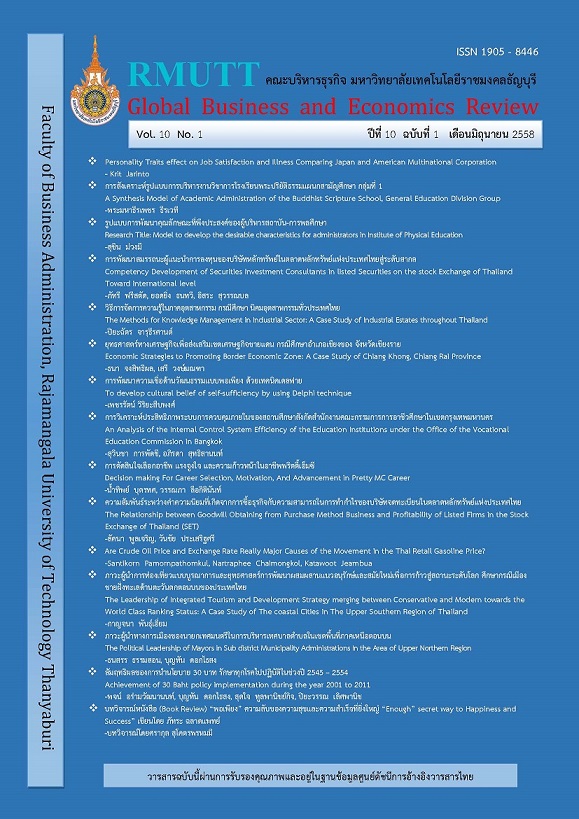RESEARCH TITLE: MODEL TO DEVELOP THE DESIRABLE CHARACTERISTICS FOR ADMINISTRATORS IN INSTITUTE OF PHYSICAL EDUCATION
Keywords:
Model to Develop the Desirable Characteristics, Administrators of Institute of Physical Education, Delphi TechniquesAbstract
The purposes of this research were: 1) to study desirable characteristics for Administrators in Institute of Physical Education. 2) to Design desirable characteristics model. 3) to study the possibility of using desirable characteristics model. The methodology of the study comprised of the following steps: 1) analyzing the documents concerning the characteristic for administrators; 2) designing and testing the questionnaires about the administrators’ desirable characteristics. 3) developing and creating characteristics for administrators. 4) developing the desirable characteristics by using Delphi technique and confirmatory factor analysis. 5) finding the suggested information to create the desirable characteristics. The statistical pieces of device use for this study were percentage, median and interquartile range. The results of this research revealed six aspects of the desirable characteristics for administrators in Institute of Physical Education, which were as follows : 1) skills and knowledge of administrative work and expertise in the area of physical education; 2) unifying and coordination skills; 3) flexible to change, understanding of the nature of paradigm change and change leader; 4) being honest and ethical; 5) involved and being a hard-working; 6) respectable person, having the right personality and being a good role model. The results of Delphi technique and confirmatory factor analysis were confirmed. According to the information displayed, the results revealed that the administrators’ training curriculum and the assessment of the training manuals all criteria were acceptable. The experts had approved all criteria to be used.
References
ชัยเสฏฐ์ พรหมศรี. (2549). ภาวะผู้นำองค์กรยุคใหม่. กรุงเทพฯ: เอ็กซเปอร์เน็ท.
ถวิล อรัญเวส. (2544, กุมภาพันธ์). นักบริหารมืออาชีพในยุคเขตพื้นที่การศึกษา. วารสารวิชาการ. 4(2): 17-18.
วิทเวช วงษ์เพม. (2555). การวิเคราะห์ยืนยันองค์ประกอบโดยโปรแกรมสำเร็จรูปคอมพิวเตอร์. อ่างทอง: สถาบันการพลศึกษา.
สถาบัน-การพลศึกษา, กระทรวงการท่องเที่ยวและกีฬา. (2552). เอกสารประชาสัมพันธ์สถาบันการพลศึกษา. กรุงเทพฯ: สำนักงานรองอธิการบดี.
สุรศักดิ์ ปาเฮ. (2543, มิถุนายน). สู่มิติการเป็นนักบริหารการศึกษามืออาชีพ. วารสารวิชาการ. 3(6): 70-74.
อรุณ รักธรรม. (2527). หลักมนุษยสัมพันธ์กับการบริหาร. กรุงเทพฯ: ไทยวัฒนาพานิช.
Barnes, L., & Kriger, M. (1986). The hidden side of organizational leadership. Sloan Management Review, 28(1), 15-25.
Boles, K., & Troen, V. (1992). How teachers make instructuring happen. Education Leadership. 49(5), 53-56.
Burns, J. (1978). Leadership. New York: Harper & Row.
Hoy, W., & Miskel, C. (1987). Theory, research and practice (3rd ed.). New York: Random House.
Luther, G., & Lyndall U. (1936). Papers on the science of administration. Retrieved from http://www.idis.ru.ac.th/report/index.php?topic=2064.0
Manasse, A. (1986). Vision and leadership: Paying attention to intention. Peabody Journal of Education, 63(1), 150-173.
Robert, K., & Daryle M. (1970) Determining Sample Size for research activities. The NEA Research Bulletin, 38(9): 30.
Downloads
Published
How to Cite
Issue
Section
License
The articles published in this journal are the intellectual property of their respective authors.
The views and opinions expressed in each article are solely those of the individual authors and do not reflect the positions of Rajamangala University of Technology Thanyaburi or any of its faculty members. All components and content of each article are the sole responsibility of the respective authors. In the event of any errors, the authors shall bear full responsibility for their own work.








